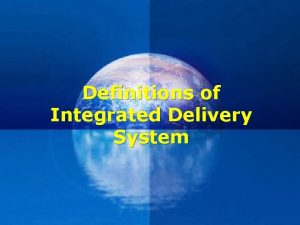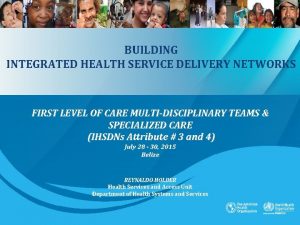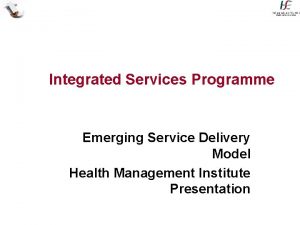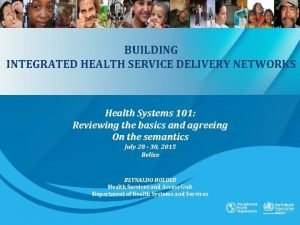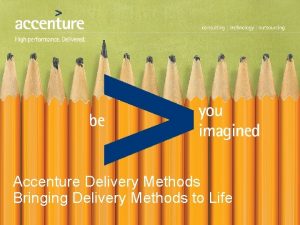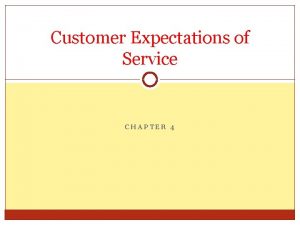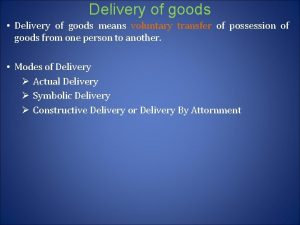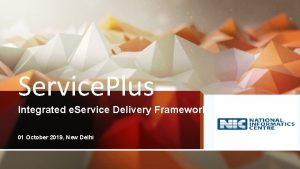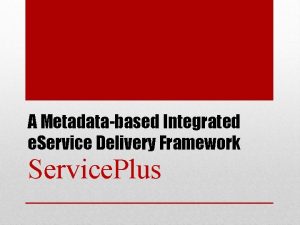All means all WHAT IS INTEGRATED SERVICE DELIVERY









- Slides: 9

All means all WHAT IS INTEGRATED SERVICE DELIVERY WITH CO-ENROLLMENT AND WHY DOES IT MATTER?

Topics for this session: • Defining ISD with co-enrollment • Why is co-enrollment important? • How does it benefit the customer? • What are the implications for staff?

What is Integrated Service Delivery? The delivery of Work. Source services in a manner that aligns/braids the resources of participating partners to seamlessly address the training and employment needs of system customers - job seekers and businesses. Job seekers and businesses are system customers, not program customers – “all means all”

ISD puts the job seeker, business and community in the center. . …Co-enrollment helps staff to more flexibly and seamlessly serve job seekers. Funding stream 1 Services Funding stream 4 Job seekers, businesses, community Funding stream 3 Funding stream 2

Who is doing it? • Oregon, Texas, California, New York, Michigan, Indiana, Missouri, Utah, and others • ISD states responsible for driving the nation’s Title I performance • Many local areas are also implementing across the country • In Washington • Voluntary - 7 of the 12 WDAs asked the state to work with them to implement. • Seaking, Snohomish, Pac. Mtn, Spokane, Olympic, Southwest and Benton-Franklin • Work. Source Auburn was the first to implement starting on 5/2/16! • Focused on co-enrollment of WIOA Title I (Adult and Dislocated Worker) and WIOA Title III (Wagner. Peyser). • May co-enroll most participants from other workforce program into Titles I & III: Title I Youth, Trade Act, LVERs and DVOP, Work. First, Title II Adult Education and Literacy, Title IV Vocational Rehabilitation, TANF and SNAP

Why do ISD with co-enrollment? • For the job seeker – Everyone in the system is invested in your success • For the business – Everyone is the system is working to develop the talent you need • For the community – Services based on the full array of job seekers, not just those eligible for selected programs • For policy makers/taxpayer – real ROI for your investment • For staff – the ability to add value based on your talents rather than your funding stream, the ability to get credit for what you may already be doing • For the system – the ability to fully understand the population needing services and create the right mix of services based on their needs

Why do ISD with co-enrollment? The keys to job seeker success • Engagement • Accessing services increases the odds of success • Skill development and documentation • Skills are key to getting jobs in today’s labor market

Components of co-enrolled ISD • Co-enrolling as many job seekers as possible into WIOA in order to • Braid/direct services based on customer need. • Engaging seekers with a robust menu of services tied to positive labor market outcomes: • More engagement from the welcome process on • More opportunities for skill development, certification and work-based experiences • More work shops and group services • Organizing staff/services into functional teams, rather than programmatic ones. • Meeting a common set of outcome measures for all customers. • Using customer input (job seeker and business) to continuously improve services.

Key points • All means all • System not program customers • Mass customization • Co-enrollment supports greater service integration • The keys to success are engagement and skill development and documentation
 Integrated delivery system pros and cons
Integrated delivery system pros and cons Integrated delivery network definition
Integrated delivery network definition Integrated project delivery ppt
Integrated project delivery ppt First level service
First level service Integrated services delivery
Integrated services delivery Aia integrated project delivery
Aia integrated project delivery Health service delivery network
Health service delivery network Plan analyze design build test deploy
Plan analyze design build test deploy Desired service and adequate service example
Desired service and adequate service example Customer wants open delivery
Customer wants open delivery

